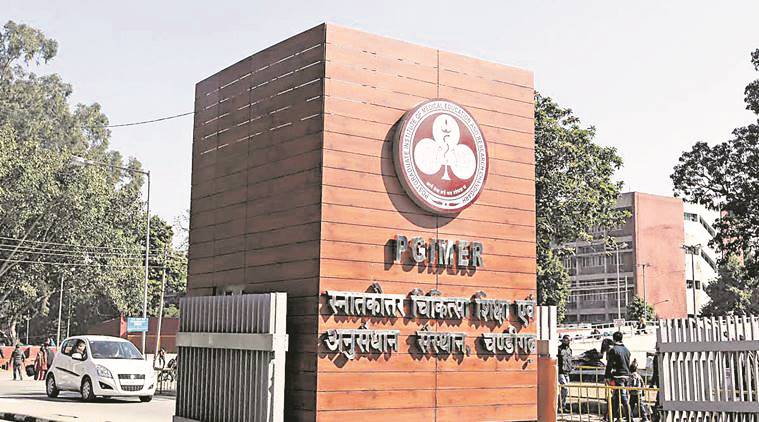 Dr Dorje, who is currently posted at the ICU unit dedicated for severely-ill COVID-19 patients at PGIMER’s Nehru Extension Block, reveals that at least three physiotherapists are posted on COVID-19 duty every week at the hospital.
Dr Dorje, who is currently posted at the ICU unit dedicated for severely-ill COVID-19 patients at PGIMER’s Nehru Extension Block, reveals that at least three physiotherapists are posted on COVID-19 duty every week at the hospital.
Though the integral role of medical specialists, anesthesiologists and ENT doctors in treating critically-ill COVID-19 patients is known, little has been said about the role played by physiotherapists in assisting these patients towards full recovery.
“We are posted mostly in the ICU ward and cater to severely-ill patients, and our service can prove to be quite crucial towards the recovery of these patients. Especially those who develop cardio-pulmonary complications,” says Dr Chhewang Dorje, a doctor from the Physiotherapy department at the Post Graduate Institute of Medical Education and Research (PGIMER).
Dr Dorje, who is currently posted at the ICU unit dedicated for severely-ill COVID-19 patients at PGIMER’s Nehru Extension Block, reveals that at least three physiotherapists are posted on COVID-19 duty every week at the hospital.
“I am at the ICU for a six-hour long morning duty between 8 am and 2 pm this week. During this time, I have to remain in close contact with the patients to teach them breathing exercises to help expel mucus build up from their lungs,” explains the physiotherapist.
Facilitating Respiratory comfort
The most crucial role physiotherapists play in aiding the recovery of a COVID-19 patient is in facilitating easier breathing through inspiratory muscle strengthening exercises and removing excessive mucus from the respiratory tract.
This intervention is not usually required for COVID-19 patients who have a consistent dry cough, but in patients who have a more productive cough. “The patients who have consistent dry cough, we avoid teaching them exercises because it might end up aggravating their cough instead and lead to producing more droplets and aerosol particles.
But in some acute cases, who have a dry cough, limited breathing exercises might actually help them take longer and easier breaths,” says Dr Dorje. These exercises can in turn help oxygen circulation in these patients, who often have low blood oxygen due to breathing difficulties. “In patients with a dry cough and less severe symptoms of the disease, we make our decision on whether to provide them physiotherapy, on a case-to-case basis,” he says.
For more severe cases of COVID-19, where patients develop respiratory complications in the form of pneumonia accompanied with a productive cough, a cough which attempts to expel mucus, physiotherapists intervene by teaching breathing exercises to help the patients cough the mucus out. “If the patient is able to expel the mucus up to their upper respiratory tract, we teach them exercises which allows them to expel it further out of their body through cough. This is preferable, because it allows them to train their own body to expel the mucus rather than being dependent on external procedures,” says Dr Dorje.
However, in critically-ill patients who are not at all able to expel the mucus out of their lungs, physiotherapists work alongside ENT doctors to use a flexible catheter to suction out the mucus from the patient’s body. This suction procedure can either be conducted orally or through tracheostomy, a process which involves making an incision on the anterior of the trachea.
All these procedures require physiotherapists to remain in close contact with the patient, who is likely to continuously cough while he or she is taught breathing exercises and positioning. Hence, the physiotherapists involved in the procedure need to remain extra cautious and wear high quality protective gear at all times.
Post operation recovery
Furthermore, since many patients admitted to the COVID-19 ward at PGIMER have tested positive during or post a surgical procedure, physiotherapists have to deliver general post operation aid to these patients as well.
“They might not even be symptomatic or have any breathing difficulties. These could be patients of neurological surgery or an orthopedic surgery who need post-operation physiotherapy to truly recover, as one does after a major surgery usually,” says Dr Dorje.
“We cannot delay their physiotherapy just because they have COVID-19, as it will deteriorate their co-morbidities and make them more vulnerable to the disease,” adds the junior resident.
After recovering from a critical illness, patients also develop something known as “post intensive care syndrome” which is characterised by hampering of physical abilities, cognitive functions and psychological well-being. “We have to work along with psychologists to counsel these patients on what they have to do even after they are discharged.
We teach them how they can deal with fatigue and strengthen their body through a few exercises,” says Dr Dorje.